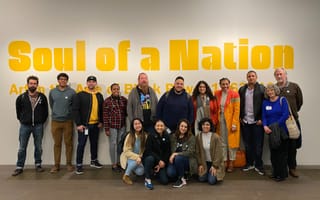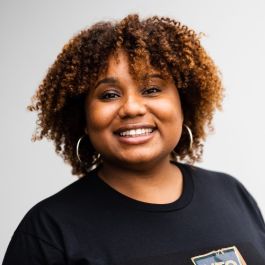
More tech companies are investing in diversity, equity and inclusion (DEI) than ever before.
That’s according to Built In’s “State of DEI in Tech” report, which found an increase in companies investing in DEI programs and DEI-focused staff between 2019 and 2020.
While dedicated funds is a crucial step in fostering a DEI-forward environment, there’s one skill that Diversity Resources Founder Richard T. Alpert calls “the most important for diversity in the workplace training.”
Alpert is referring to ‘cultural competence,’ which is the ability to understand and engage with people from different cultures.
“The more different cultures work together, the more cultural competency training is essential to avoid problems,” said Alpert on the Diversity Resources’ website, which provides diversity-focused live and virtual trainings, videos and more. He added that a lack of cultural competency in the workplace can lead to miscommunication, conflict and stunted productivity.
But there are plenty of ways for companies to build cultural competency, and in turn, create a more diverse, equitable and inclusive environment. To learn how San Francisco tech companies are tackling this issue, Built In SF turned to leaders at Chime, Unity Technologies, Granular and Ethos Technologies.
By providing opportunities for their employees to learn about varying experiences and share in those experiences, Chime is creating an environment that celebrates cultural diversity. Head of Diversity, Equity and Belonging Erica Johnson shared what these opportunities look like.
What’s one step Chime has taken to help employees improve their cultural competency?
We believe that building cultural competency starts with understanding different perspectives. To that end, we’ve worked to help employees build empathy through various practices, such as sharing Chimers’ stories internally and facilitating conversations with external experts to encourage kindness and compassion at work. For example, we recently highlighted Chimer parents in an internal series on their experiences working from home with their children and continue to host an ongoing series of cultural discussions with Carol Langlois, the founder of Empowered Tech.
These conversations span topics that have included the varying experiences of elections, how to voice opinions assertively, and inclusively in the workplace, and an ongoing series for our female Chimer resource group, ChimeHers, where cohorts met once a week to talk through challenges they’re facing. Because these are sustained and ongoing conversations, people from across the company have been able to come together and bond over their shared experiences and learn from their differences.
How does your company promote or celebrate cultural diversity in the workplace?
We work to promote and celebrate cultural diversity in both passive and active ways in the workplace. We’ve created a library of internal and external-facing content that highlights different cultural experiences for Chimers. For example, we highlighted several Chimers and Chime members in celebration of Black History Month through content on our blog and “Life at Chime” publication. For those who wanted to attend an event, our Black Chimer resource group (CRG), AfroChime, hosted a lunch-and-learn on Black representation through the lens of superheroes. For Lunar New Year, we published a piece on the traditions of one Chimer and hosted a virtual dumpling making class with the owner of a local restaurant.
By honoring the different ways in which people have the capacity to celebrate cultural diversity, we believe that blending content with interactive events helps us cater to the different needs on our team while still promoting the diversity that makes Chime and our community special.
How does cultural competence show up in the ways your employees communicate and relate with one another?
Cultural competency shows up in our daily interactions, meetings, written communication, on private or public Slack channels, and at companywide events. How people speak to each other is a key indicator of how Chimers are relating to each other and of the culture of belonging we are creating. We see prolonged high engagement and inclusive language used on our various cultural-themed Slack channels, which demonstrates not only the awareness of other cultural practices and experiences but also an appreciation of and support for them. People use a shared lexicon around company values and will often ask if others want to “chime in” or “team up,” and use our company’s values emojis, too. What’s more, Chimers’ cultural competence shows up through the attendance of our internal company cultural events and engagement with cultural content.
Zooming out, we believe that cultural competence shows in the overall trends of positive engagement and retention at Chime. Because cultural competence contributes directly to inclusion and employee engagement, we can look beyond daily anecdotes of communication and relation to see that employees feel connected, welcome and like they belong at Chime.
With five employee resource groups (ERGs), an inclusive onboarding session and a rotating calendar celebrating global heritages, Unity Technologies is taking actionable steps to boost cultural competency. Chief Esparza, who oversees inclusion communications, policy and programs, shared how these initiatives are making an impact at the real-time 3D content creation platform.
What’s one step your team has taken to help employees improve their cultural competency?
Every new Unity employee is invited to an inclusion onboarding session that teaches them how to apply our empathy, respect, and opportunity framework to their work. By adding to their empathy toolkit and learning more about respectful engagement, each employee is able to apply practices that are fundamental to improving their own cultural competency within a global workspace.
How does your company promote or celebrate cultural diversity in the workplace?
Unity has established five global ERGs supportive of our Asian, Black, Latinx, LGBTQ+, and women colleagues. Under the “community is for all” approach, we encourage employees to join any ERG in order to promote learning, partnerships and allyship across different experiences of culture and identity. This is accomplished through each ERG’s three pillars: recruiting and retention, professional development and community engagement.
Additionally, we plan and produce dozens of activities throughout the year to celebrate, honor and recognize important heritage, history and awareness dates that are significant to communities underrepresented in tech and gaming. Through events, social media posts and internal communications aligned to these dates, we are able to highlight the diverse experiences of our global workforce.
How does cultural competence show up in the ways your employees communicate and relate with one another?
In addition to the inclusion onboarding workshop for new employees, we regularly publish communications tools and resource guides for our employees to expand their knowledge and learn more about engaging with empathy and respect with one another. We also provide training on inclusive conversations with our leadership to help them build more inclusive experiences across their teams.
Prior to the summer of 2020, Granular’s social media channels never took a political stance. That all changed following the death of George Floyd. VP of People Operations Jennifer Trendler explained why the farm management platform changed its tune and how it has impacted cultural competency.
What’s one step Granular has taken to help employees improve their cultural competency?
We’ve been very clear on why cultural competency is critical to our team and have communicated this with our employees. We’re clear that if people are not culturally competent, we won’t be able to attract or retain talent, which is key to us as a business and, most importantly, the right thing to do to create the world we want to live in.
2020 was a year of reckoning for us, along with many others. Our cultural competency efforts did not start here, but our focus and efforts accelerated after the death of George Floyd. We never before commented on social media what might be thought of as political events, but it was clear we needed to be very vocal on our stance. We held listening sessions over a few days led by our senior leadership team. Out of those sessions came a very clear desire for people to help drive change. We formed a racial justice subcommittee that meets monthly and has driven philanthropy efforts and guest speaker events, which has provided a safe space to have hard conversations. Our work is not done here but having ways to continue this work ensures we’ll continue to all get more culturally competent.
How does your company promote or celebrate cultural diversity in the workplace?
We look for opportunities to celebrate cultural diversity at Granular. Over the years, this has included celebrating Black History Month, Women’s History Month and holidays such as Holi and Chinese New Year.
For Women’s History Month, we hosted two roundtable discussions with some of our female leaders to share their experiences, career paths and examples of when they’ve addressed barriers. We leveraged our company philanthropy program and matched employee donations to a women in agriculture-focused nonprofit during March and created Zoom backgrounds to acknowledge and highlight the contributions of women throughout history.
We’ve also created opportunities for our folks to share more about their personal lives and experiences, if they’d like to. This has included a happy hour hosted by our team in Brazil that featured a cooking demonstration and a history lesson. Our efforts to dig a little deeper has bred more connection and cultural competency.
How does cultural competence show up in the ways your employees communicate and relate with one another?
Cultural competence is evident when we see varied and active representation from those attending our Women’s History Month roundtable or our sessions on “Why Black History Matters” and “A Conversation on Racism, Riots and Violence.” It’s seen in the makeup of our racial justice subcommittee, where we hear the passion and see the commitment from that group to impact change.
We observe it every day when someone speaks up to note that the same person is being asked to take notes at meetings, or when we need to take a beat to listen and have empathy for an experience that may be very different from our own. Empathy is at the core of our culture, which is not a fast track to cultural competence, but does lend itself to having those hard conversations and effecting change in thoughtful ways.
Ethos Technologies’ Head of People Jessica Mowry shared how virtual cooking classes led by colleagues have helped connect their team and promote cultural understanding while working remotely. The life insurance platform also created four ERGs and aims to promote diversity of thought through its core value, “speak your mind.”
What’s one step your team has taken to help employees improve their cultural competency?
DEI is a mindset and one we are working to embed in every facet of how we build our company through talent strategy, brand strategy, leadership, culture, analytics and more. At the end of the day, we know that DEI leads to better outcomes. As a starting point, we’ve established a D&I committee, as well as four ERGs: Shethos, Parents at Ethos, Black at Ethos, and Pride. All groups are open to any Ethosaurs. We love having allies, regardless of someone’s background, and we welcome all!
How does Ethos promote or celebrate cultural diversity in the workplace?
During our time of remote work, we created what we call “Master Class.” Each class is hosted by an Ethosaur who teaches and shares something that they're passionate about. Our VP of engineering led a cooking class on how to cook Amritsari Machhi, the Punjabi dish featuring freshwater fish; Began ka Bharta, a smoky and spicy eggplant dish from North India; and Arhar ki Dal, a lentil soup that is a staple of Indian home cooking. We’ve also had sessions on mindfulness, led by our program manager, and an origami class with our sales operations associate.
In addition to Master Classes, we celebrate holidays and global events. Our Black at Ethos group just spearheaded thought-provoking programming for Black History Month to raise awareness and celebrate the often marginalized contributions of Black figures throughout history. We also encouraged teammates to share their recollections of learning about Black history as a student growing up.
How does cultural competence show up in the ways your employees communicate and relate with one another?
One of our core values is “speak your mind,” and we operate by the principle “strong opinions, loosely held.” This allows us to come with a perspective, ask each other probing questions, challenge each other's thinking, and ultimately leverage our diversity of thought to arrive at the best solution.
During the Black Lives Matter movement, we created Black at Ethos and initiated a matching donation program for civil rights organizations. These discussions are ongoing and remain an integral part of our cultural competence.
We take care of each other by offering wellness benefits to support mental health. We’ve joined forces with Ginger, Headspace and Calm to promote a healthier mindset. We offer four weeks of paid leave for caregivers and up to 18 weeks of parental leave for new families. We also have flexible PTO.















